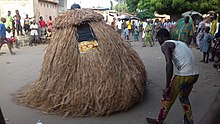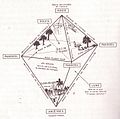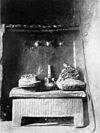Portal:Traditional African religions
Introduction The beliefs and practices of African people are highly diverse, including various ethnic religions. Generally, these traditions are oral rather than scriptural and are passed down from one generation to another through folk tales, songs, and festivals, and include beliefs in spirits and higher and lower gods, sometimes including a supreme being, as well as the veneration of the dead, and use of magic and traditional African medicine. Most religions can be described as animistic with various polytheistic and pantheistic aspects. The role of humanity is generally seen as one of harmonizing nature with the supernatural. (Full article...) Selected articleAfrican divination is divination practiced by cultures of Africa. Divination is an attempt to form, and possess, an understanding of reality in the present and additionally, to predict events and reality of a future time. Cultures of Africa to the year circa C.E. 1991 were still performing and using divination, both within the urban and the rural environments. Diviners might also fulfill the role of herbalist. Divination might be thought of as a social phenomenon, and is thought of as central to the lives of people in societies of Africa (circa 2004 at least). Selected imagesFestivalsThere are several religious festivals found in the various Traditional African religions. Some of these are listed below next to their corresponding religion :
Selected biographyMaad Semou Njekeh Joof (or Maad Semou Djiké Diouf) was a member of the Joof Dynasty of the Kingdom of Sine now part of independent Senegal. Maad means king and Maad a Sinig means king of Sine in Serer. He was the founder of the Royal House of Semou Njekeh Joof, founded in the early eighteenth century. His royal house was the third and last royal house founded by the Joof family of Sine and Saloum. Since its foundation, at least seven kings of Sine from his royal house had succeeded to the throne including his son Maad a Sinig Boukar Tjilas Sanghaie Joof. In the Serer religion, Semou Njekeh Joof is immortalized in the cult of Tagdiam. The principle shrine of Tagdiam is named after him. Tagdiam in present-day Senegal was where he lived. Selected quote
On the influence of African religion on art, Aloysius M. Lugira (2009), quoting Ladislas Segy (1975), Source: African Traditional Religion, Third Edition, 2009 by Aloysius M. Lugira, quoting Ladislas Segy, "African Sculpture Speak",Da Capo Press (1975), p. 118, ISBN 9780306800184
Did you know
Related portalsTopicsFor more Traditional African religion topics, see Category:Traditional African religions.
CategoriesWikiProjectsThings you can doAssociated WikimediaThe following Wikimedia Foundation sister projects provide more on this subject:
Discover Wikipedia using portals |





































